|
|
|
|
|
|
|
|
|
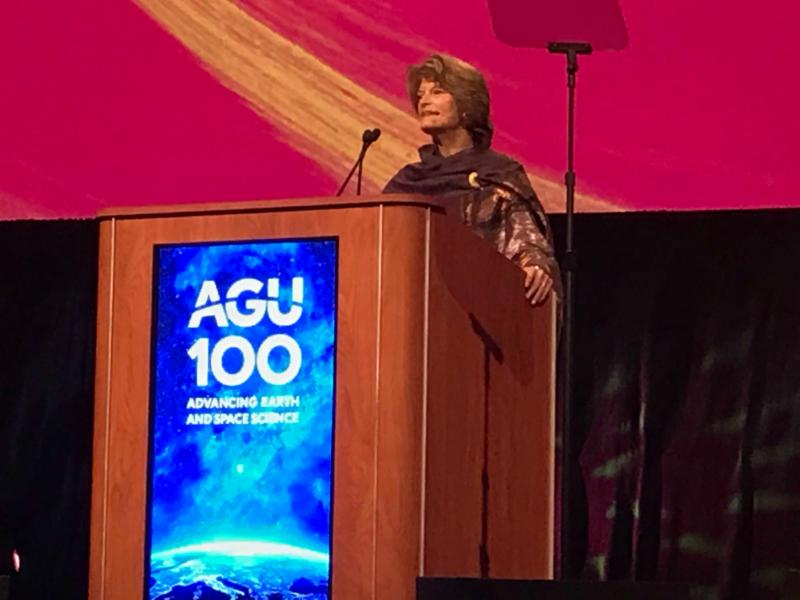 Keynote: US Senate Perspectives on Science Policy, December 12, 2018 (Washington, DC. USA). Keynote: US Senate Perspectives on Science Policy, December 12, 2018 (Washington, DC. USA). U.S. Senators Lisa Murkowski of Alaska and Maria Cantwell of Washington will discuss today's top science policy topics, from hazards to scientific integrity. The senators will be sharing remarks on the science policy issues facing their constituents and the world, followed by a Q&A moderated by AGU CEO and Executive Director Chris McEntee. This event is part of the American Geophysical Union Fall Meeting.
American Geophysical Union Fall meeting, December 10-14, 2018 (Washington, DC USA). The AGU 2018 Fall Meeting will mark another dynamic year of discovery in Earth and space science, serve as the advent of AGU's Centennial year, and provide a special opportunity to share our science with world  leaders in Washington, D.C. As the largest Earth and space science gathering in the world, the Fall Meeting places you in th e center of a global community of scientists drawn from myriad fields of study whose work protects the health and welfare of people worldwide, spurs innovation, and informs decisions that are critical to the sustainability of the Earth.
ArcticNet: Annual Scientific Meeting 2018, December 10-14, 2018 (Ottawa, ON Canada). Canada's North is experiencing unprecedented change in its sea and terrestrial ice, permafrost and ecosystems under the triple pressures of climate change, industrialization and modernization. The impacts of these pressures can be seen on food and energy security, shipping, sovereignty, northern community health and well-being, and sustainable development and resource exploitation. All these issues have brought the North to the forefront of national and international agendas. Building on the success of its previous Annual Scientific Meetings and International Arctic Change Conferences, the Arctic Network of Centers of Excellence announces the 14th ArcticNet Annual Scientific Meeting.
|
Media
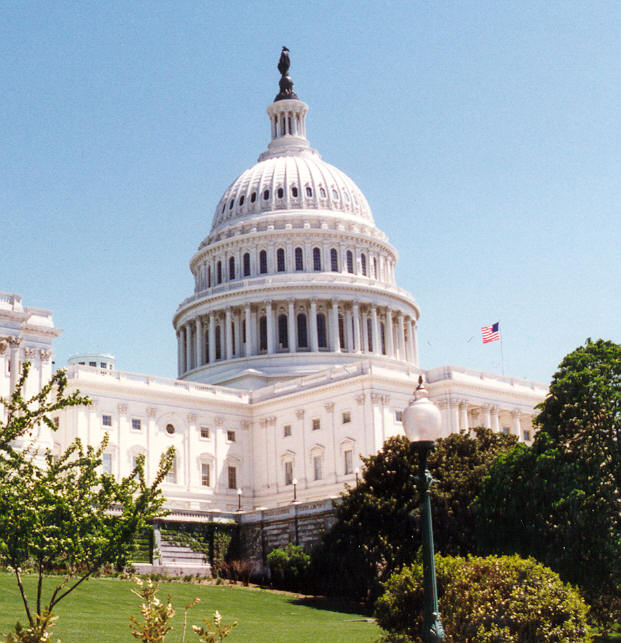 Murkowski Unveils Arctic Legislation to Reinvigorate America's Arctic Role. U.S. Senator Lisa Murkowski (R-AK) unveiled legislation aimed to raise the nation's presence in the Arctic through two bills, the Arctic Policy Act (APA) and the Shipping and Environmental Arctic Leadership Act (SEAL Act). The APA takes steps to increase local and indigenous voices in federal science and policy in the Arctic while the SEAL Act establishes a congressionally charted seaway development corporation in the Arctic. As shipping and maritime traffic in the Arctic is expected to grow, the SEAL Act specifically establishes a corporation that will collect voluntary maritime shipping fees from vessels utilizing the region, which will fund resources and infrastructure necessary to ensure the safety, security, and management of the Arctic. Senator Dan Sullivan (R-AK) is a co-sponsor of both the SEAL Act and APA. Senator Lisa Murkowski Murkowski Unveils Arctic Legislation to Reinvigorate America's Arctic Role. U.S. Senator Lisa Murkowski (R-AK) unveiled legislation aimed to raise the nation's presence in the Arctic through two bills, the Arctic Policy Act (APA) and the Shipping and Environmental Arctic Leadership Act (SEAL Act). The APA takes steps to increase local and indigenous voices in federal science and policy in the Arctic while the SEAL Act establishes a congressionally charted seaway development corporation in the Arctic. As shipping and maritime traffic in the Arctic is expected to grow, the SEAL Act specifically establishes a corporation that will collect voluntary maritime shipping fees from vessels utilizing the region, which will fund resources and infrastructure necessary to ensure the safety, security, and management of the Arctic. Senator Dan Sullivan (R-AK) is a co-sponsor of both the SEAL Act and APA. Senator Lisa Murkowski
S. 3739, Arctic Policy Act (APA), is available here. S. 3740, the Shipping and Environmental Arctic Leadership Act (SEAL Act), is available here.
 Arctic Report Card Tracks Region's Environmental Changes. Arctic Report Card Tracks Region's Environmental Changes. NOAA's annual report card on the Arctic, released today at the American Geophysical Union fall meeting in Washington, D.C., measures the changing climate of the polar region including warmer air and ocean temperatures and declines in sea-ice that are driving shifts in animal habitats. Now in its 13th year, the 2018 Arctic Report Card is a peer-reviewed report that provides an annual status update on the region and compares these observations to the long-term record. It was compiled from the research of 81 scientists working for governments and academia in 12 nations. This information can be used to inform decisions by local, state and federal leaders as Arctic residents confront the challenges and opportunities posed by a rapidly changing climate and ecosystem. Phys.org
Arctic Contaminants Researchers Wins $100K Lifetime Achievement Award. A Canadian government scientist who has attracted attention for his research in Arctic contaminants was given a lifetime achievement award by a charitable foundation on Wednesday. Derek Muir is the recipient of the $100,000 Weston Family prize for northern research by The W. Garfield Weston Foundation. Muir, a research scientist with Environment and Climate Change Canada, was born in Montreal and is based in Brampton, Ont. CBC News
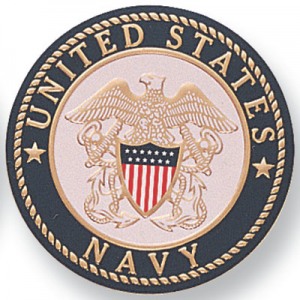 Navy Secretary States 'Wish List' For Arctic Operations. Navy Secretary States 'Wish List' For Arctic Operations. The Navy needs to beef up its presence in the Arctic to counter potential adversaries, the service's top civilian said Dec. 6. As Russia and China continue to dedicate more assets to the region, the United States has responded with plans to ramp up the size of the Coast Guard's icebreaker fleet. However, more needs to be done, Secretary of the Navy Richard Spencer said during remarks at the Center for Strategic and International Studies. National Defense Magazine
Arctic Permafrost Might Contain 'Sleeping Giant' of World's Carbon Emissions. As temperatures rise in the Arctic, permafrost, or frozen ground, is thawing. As it does, greenhouse gases trapped within it are being released into the atmosphere in the form of carbon dioxide and methane, leading to previously underestimated problems with ocean acidification and potential mercury poisoning. About one quarter of the region is covered in permafrost, which is soil, sediment or rock that has been frozen for at least two years. With its retreat, the carbon that is released could contribute significantly to global warming. Phys.org
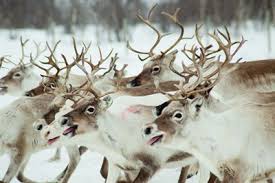 Climate Change: Arctic Reindeer Numbers Crash by Half. Climate Change: Arctic Reindeer Numbers Crash by Half. A new report on the impact of climate change in the Arctic revealed that numbers fell from almost 5 million to around 2.1 million animals. The report was released at the American Geophysical Research Union meeting. It revealed how weather patterns and vegetation changes are making the Arctic tundra a much less hospitable place for reindeer. BBC News
|
|
Future Events
The Synoptic Arctic Survey Informational Meeting During the AGU Fall Meeting, December 13, 2018 (Washington, DC USA). The Synoptic Arctic Survey (SAS) will be hosting an informational meeting during the American Geophysical Union (AGU) 2018 Fall Meeting. This open meeting will convene 12:30 - 1:30 p.m. Eastern Standard Time on Thursday, 13 December 2018 at the Cambria Hotel Washington D.C. Convention Center (899 O Street NW, Washington, DC, 20001), Duke Ellington Room 1, in Washington D.C. The SAS is a developing international program envisioned to mount a coordinated, multi-nation, oceanographic field-based effort on a Pan Arctic Scale quasi-synoptically over a single season to achieve the baseline understanding of the fundamental structure and function of the linked carbon-ecosystem-physical systems that will permit detection of ongoing and future changes. Development of the program has been ongoing since 2015.
Fast Thaw, December 14, 2018 (Washington, DC USA). Arctic 21 will host a presentation with Dr. Katey Walter Anthony. The discussion with consider permafrost thaw and methane emissions from lakes in the Arctic.
'UK-US Maritime, Aerospace and Security Cooperation in the Arctic'. Delegates will discuss and debate trade and security-focused Arctic collaboration in the Arctic between US, the UK, and their allies. This convening is designed to deepen the UK-US special relationship by strengthening trade and cooperation in four areas in particular: maritime services, aerospace, fisheries, defense and security. The Arctic Encounter London is co-produced by the Polar Research and Policy Initiative and the Arctic Encounter. The Polar Research and Policy Initiative (PRPI) is a London-based international think-tank dedicated to Arctic, Nordic, North Atlantic, North Pacific and Antarctic affairs. The Arctic Encounter is the largest annual Arctic policy and business conference convening in the United States, with partnerships and convening efforts worldwide.
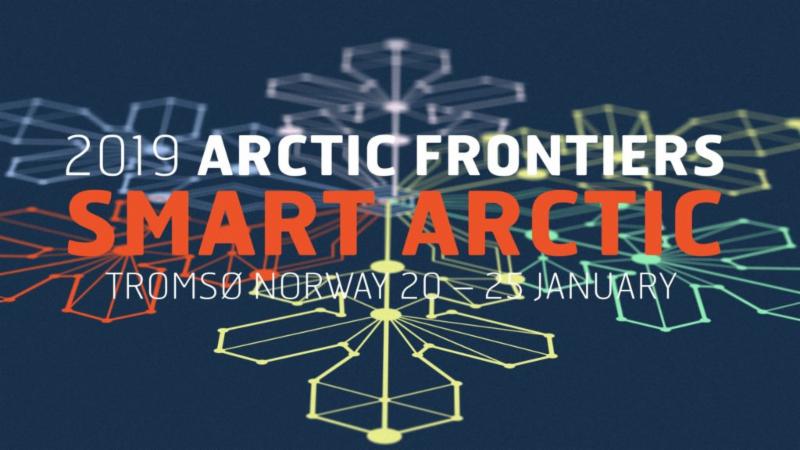 Arctic Frontiers, January 20-25, 2019 (Tromso, Norway). The Arctic Frontiers is a global scientific conference on economic, societal, and environmental sustainable growth. This year's theme will be "Smart Arctic," with a pan-arctic emphasis, and an effort to build new partnerships across nations, generations and ethnic groups. Arctic Frontiers provides a forum for dialogue and communication between science, government and industry. The plenary program will have five main sessions: State of the Arctic, Blue Growth, Smart Solutions, Bridging the Gap, and Arctic business prospects. An abstract-driven science program will address Plastics in the Ocean, the Future of Governance and Handling Vulnerability in Arctic Ecosystems, State of the Arctic and A Smart Arctic Future.
Save the Date! 
Mark your calendars to attend IDA-8, which some have called one of the best Arctic gatherings around. Historically, this biennial symposium was co-hosted by U.S. National/Naval Ice Center (NIC) and the US Arctic Research Commission (USARC). In 2019, these partners will join forces with the preeminent Wilson Center's Polar Institute, as a third co-host. The now 2-day symposium will be held in the Ronald Reagan Building Amphitheater, in Washington, DC. The event will focus on a broad cross-section of naval and maritime operations and issues in an ice-diminishing Arctic. The symposium brings together nationally and internationally recognized experts on Arctic governance, geopolitics, marine operations, infrastructure, science, and environmental observations, from the local, regional, and pan-Arctic scale. Information on prior symposia, including lists of speakers, video clips, and copies of presentations, is available here. Attendance is free, and registration will begin in Spring 2019. The event will be webcast live, and video recorded.
 of the AAG includes over 8,500 geographers converging from the U.S., Canada, and nearly 60 other countries in a typical year including geographers, GIS specialists, environmental scientists, and other leaders for the latest in research and applications in geography, sustainability, and GIScience. of the AAG includes over 8,500 geographers converging from the U.S., Canada, and nearly 60 other countries in a typical year including geographers, GIS specialists, environmental scientists, and other leaders for the latest in research and applications in geography, sustainability, and GIScience.
|
|

  
4350 N. Fairfax Drive, Suite 510
Arlington, VA 22203, USA
External links in this publication, and on the USARC's World Wide Web site ( www.arctic.gov) do not constitute endorsement by the US Arctic Research Commission of external Web sites or the information, products or services contained therein. For other than authorized activities, the USARC does not exercise any editorial control over the information you may find at these locations. These links are provided consistent with the stated purpose of this newsletter and the USARC Web site.
|
|
|
|
|
|
|
|
|